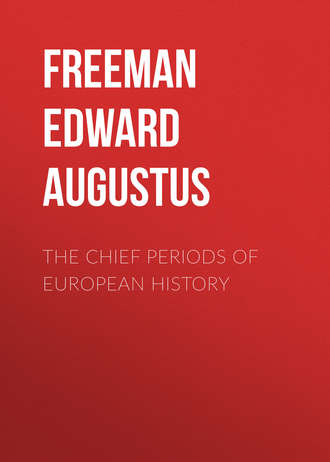 полная версия
полная версияThe Chief Periods of European History
Our scene then opens with the picture of the Greek while still shut up in his own special land of islands and peninsulas. We ask not for our purposes how and whence he came thither; we ask not the exact measure of his kindred in blood and speech to the other nations around him. It is enough for us that the Greek is not wholly isolated, that he is not merely one of the great Aryan family, but that he is the foremost among a group of nations who are bound to him by some closer tie than that which binds together all the branches of the great Aryan family. The exact degree of kindred between Greeks and Thracians or Phrygians we may leave to other inquirers; it is enough for us that there was the common Aryan kindred, and seemingly something more. But it is one of the leading facts of history that Greece had to deal on her immediate northern frontier, on the opposite coasts of Asia, on the opposite coasts of Italy and Sicily, with nations which, for historical purposes at least, were nearer still. Those nations had, to say the least, a power of adopting Greek ways, a power of becoming Greeks by adoption if not by birth. The boundary line between the Greek and the Epeirot, faint in the earliest days of Greece, seems for some ages to be drawn sharper and sharper. Then the tide turns; suddenly the Epeirots, the people of the oldest Hellas, the guardians of the oldest of Hellenic oracles, stand forth again in their elder character. Molottian Pyrrhos wages Western wars as a Hellenic champion and the kingdom of Pyrrhos settles down at last into a well-ordered Greek confederation.
So it is in Macedonia; so it is in Sicily; so it is in the Greater Hellas on Italian soil. All these lands, and other lands beside, become, for a longer or shorter time, part of the immediate Greek world, no less than Attica or Peloponnêsos. Greek colonization and Macedonian conquest had, each in its turn, a share in the work, and both were in many lands not a little helped by real, if unconscious, kindred on the part of those whom colonists and conquerors found already in possession. Every colony, every conquest, not only won new lands for the Greek settlers themselves, but increased the Greek nation in its wider sense by multitudes who became Greek by adoption, and in whose case the work of adoption was made more easy by the existence of earlier ties of which neither side had thought. As time goes on, as we reach the days when Greek influences were most widely spread over the Mediterranean lands, we may easily trace out zones within zones, marking out the different stages by which the Greek element grows fainter and fainter. First there is the centre of all, the original Hellas itself. Then there are the genuine colonies of old Hellas, detached fragments of Hellenic soil translated to foreign coasts. Then there are the kindred lands whose people were fully adopted into the Hellenic fold. Beyond them again lie the kingdoms ruled by Macedonian princes, where a few great cities which we must call Greek by the law of adoption are planted in lands which have received at the outside only the faintest varnish of Hellenic culture. Lastly, beyond these again, there are the barbarian lands whose princes, like barbarian princes in our own day, made a show of adopting Greek speech and Greek culture, but where the foreign tastes of the princes had no real effect on their kingdoms, and which we cannot look on as forming part of the Greek world in the laxest sense. Such was Parthia; such was Pontos. Is it too much to add to the barbarian kingdoms of the East the mighty commonwealth of the West which had once been in Greek eyes no less barbarian? It is no small part of our œcumenical story to mark how far Rome became Greek and how far Rome refused to become Greek. The facts belong to a later time; yet in some sort they form part of our present survey. The Rome which brought the Greek lands step by step, first under Roman influence, then under Roman dominion, was a Rome which had already come within the magic circle of Hellenic teaching; while keeping the essential essence of the national life untouched, while remaining truly Roman in every political institution, in every detail of law and government, she became Greek for every purpose of refined and intellectual life. Nay, Rome became, like Macedonia, a disciple that gathered in fresh disciples. Wherever Rome’s political life spread, some measure, greater or less, of Greek intellectual life spread with it.
The history of Europe before the Roman power is in truth the history of the stages by which the Greek mind made its way to this general supremacy over the civilized world, and in some sort beyond the bounds of the civilized world. Within the range of this supremacy of the Greek mind comes the narrower range of the political supremacy of powers which were either Greek from the beginning or which had become Greek by adoption. The supremacy of the Greek mind has never ceased, and is still abiding. Greek intellectual dominion has formed one side of the whole modern world; the advance of Greek political power has wrought the lesser, but by no means unimportant, work of forming one of the nations of the modern world. The modern Greek nation, meaning thereby something more than the inhabitants either of the existing Greek kingdom or of the continuous Hellas of old times, is the fruit of old Greek colonization, followed up by Macedonian conquest. I said years ago that Alexander was the founder of the modern Greek nation, and I say so still. This saying may seem to shut out the work of earlier Greek colonization, above all in those lands of Sicily and southern Italy which we have spoken of as having been admitted by adoption within the immediate Greek world. The truth is that Greek colonization has nowhere been fully lasting, it has nowhere left its abiding traces on the modern world, except where Macedonian conquest came to strengthen it. This enables us to fix a boundary for the lands which were permanently admitted within the immediate Greek world. That boundary is the Hadriatic. West of the Hadriatic Greek life has died out. The outlying Greek colonies in Gaul and Spain, deep as was their influence on Gaul, had ceased to be Greek before the great nations of modern Europe came into being. Even southern Italy and Sicily, where Greek life was strengthened by their long connexion with the Greek Rome on the Bosporos, have ceased to be Greek for some ages. The lands in which a series of invaders of whom Pyrrhos of Molottis was the last and greatest strove in vain to set up a Western Greek dominion, have fallen away from the Greek world. But the work which Alexander of Epeiros failed to do in the West was largely done by his more famous nephew and namesake in the East. If a great part of Alexander’s conquests were but for a short time, another great part of them was abiding. The work of Alexander and Seleukos fixed a line fluctuating between the Euphrates and the Tigris, as a long abiding boundary of European dominion. It fixed Tauros, the boundary of Alexander’s first Asiatic conquests, as a far more abiding boundary of European life. I have had to point out in two hemispheres, but I must point out again, how very nearly the actual range of the modern Greek nation agrees with the range of old Greek colonization east of Hadria. It has advanced at some points and it has gone back at others; but its general extent is wonderfully the same. It is an extent which in both ages has been fixed by the genius of the people. Nowhere out of the old continuous Hellas does the Greek people, none the less Greek because largely Greek by adoption, spread from sea to sea. Throughout a large part of eastern Europe and western Asia the Greek is the representative of European and civilized life on the whole sea-coast. The world of peninsulas and islands is the world of the Greek now, exactly as it was in the days of the Homeric Catalogue.
It is, as we held in our former course, with that Catalogue, the first written record of European politics, that our survey of Europe before the Roman Power must open. With all who can take a general grasp of history and who understand the nature of evidence, the Domesday of the Empire of Mykênê, puzzling to the mere porer over two or three arbitrarily chosen centuries, commands full belief. We ruled it in our former inquiry to be the highest example of a general rule, “Credo quia impossibile.” In the Catalogue we see the people of many islands and of all Argos, grouped under the Bretwalda of Hellas, already engaged in a stage, and not the earliest stage, of the Eternal Question. Herodotus, who better knew the meaning of the world’s history than the diplomatists of modern days, could point, in a mythical shape indeed, to stages earlier still. Whether there ever was a personal Agamemnôn and a personal Odysseus matters but little; it matters far more that the keen eye of Ælfred, who knew the relation of an overlord and his vassal princes, could see the relation between Ulixes with his two kingdoms and the Casere Agamemnôn of whom he held them. That Casere, kingliest among the kingly, βασιλεύτερος in the throng of βασιλῆες, is already doing the work of a Trajan or a Frederick; he is fighting for Europe on the shores of Asia. The work of Greek colonization has begun; Crete, to be won again ages after from the Saracen, is already won from the Phœnician; Rhodes is already admitted to Hellenic fellowship, to see in after days the might of Antigonos and the might of Mahomet shattered beneath her walls. The southern coast of Asia is still untouched; Milêtos is a barbarian city; but Achilleus has won Lesbos as his own prize, and on the mainland the work is doing which was to make the coasts of the Hellespont and the Propontis a foremost outpost of Greece and Europe, the land which was to witness the first exploits of the first crusaders and to behold the Eastern Rome rise to a fresh life under the firm rule of the Emperors of Nikaia. Deem we as we will as to minuter details, as we have in the Homeric poems our first glimpse of Aryan society in peace and war, so we have in them our first record, if only in a poetic form, of one stage of the great strife which changed the barbarian peninsula of Asia into that solid home of Grecian speech and Roman law which for ages held up against the ceaseless inroads of the Arabian conquerors. To the west, to the north, our range of sight is narrower. No colonist from Argos and its islands has made his way to Italy or Sicily; Akarnania is still part of the vague Mainland, the still undefined Epeiros; Korkyra is still a land of fable on which no settler from Corinth has set foot. But there are signs which already point to the kindred of the nations on both sides of the Ionian sea. The Sikel dwells on both coasts; even of the more mysterious Sikan we get a passing glimpse. The northern coast of the Ægæan is known; but that coast is not yet Hellenic; it significantly sends its warriors to fight on the Asiatic side. Further to the north, further to the west, all is wonder and mystery; we may as well ask whether the poet had any conception of the site of London as whether he had any conception of the site of Rome. The eyes of infant Greece are still fixed on the East; vague tidings had reached her of the wonders of the land by the river Ægypt; the men of Sidon were her visitors, her traffickers, in some sort her teachers. But the wary sons of Canaan were too wise to tell all they knew of Western lands and Western seas. The gold of Tartêssos was as yet for them only; for them only was the precious knowledge that the pillars of Hêraklês – if Greece had as yet heard their name – opened into no stream of Ocean parting the lands of the living and the dead, but into the boundless waters over which it was as yet for themselves alone to spread their sails.
Let us take another glance at the Mediterranean world at a later time, a time when our historic evidence is still meagre and scattered, but when we have begun to leave mere legend behind us. It is one of the gains or losses of the wider study of history that it often teaches us to look at this and that period with different eyes from those with which we naturally look at them when we are engaged only in the narrower study of special times and places. I well remember learning, and I well remember being startled as I learned, from the teaching of Mr. Finlay, that the age which we commonly look on as the most glorious in Grecian history, the fifth century before Christ, was in truth an age of Greek decline. The truth is that it was the greatest age in the history of Athens, and a crowd of causes lead us at every moment to mistake the history of Athens for the history of Greece. What we sometimes fail to see Herodotus saw clearly. He saw that in the general history of the world the age of the Persian wars was, for the Greek people as a whole, the scattered Greek people all over the world, an age of decline. The fact that there was a Persian war, a Persian war waged in Greece, is enough to prove the saying. That fact of itself shows that that process had already begun which is still not ended, the long and gloomy work of which Finlay steeled himself to write the story, the History of Greece under Foreign Domination. It is enough to prove Finlay’s point that Milêtos had learned to groan, as thrice-betrayed Jôannina groans still, beneath the yoke of the barbarian. The periods when Greek influences had most sway over the whole world are two, one earlier, one later, than the more brilliant times of our usual studies. The earlier is the greater; for it is the time when Hellas grew and spread and made wide her borders among the nations, by her own unaided strength, the time when Hellenic colonization carried everywhere, not only Hellenic speech and Hellenic arts, but the higher boon of free Hellenic political life. In the later period Hellenic speech and Hellenic arts are spread more widely than they had ever been spread before; but Hellenic political life is no longer carried with them. The external might of Greece is wielded for her by the kings of the adopted lands; we have passed from Hellenic colonization to Macedonian conquest. In neither of those periods was the most vigorous Greek life to be found in old Greece itself; the most brilliant recorded period of old Greece is the period between the two, the period of our most usual Greek studies. But it was the most brilliant because the outer bounds of Hellas had fallen back before victorious barbarians, and because old Greece rose up in a renewed strength to avenge the wrongs of her colonies and to ward off the like bondage from herself. The Greece of the fifth century before Christ is like the Rome of the fourth century after Christ. Its warfare is essentially defensive; it seldom gains new ground; it has much ado to defend old ground. It gains victories; it wins territories; but the victories are gained over threatening invaders, the territories that are won are won back from the grasp of those invaders. The work of Kimôn, the work of Agêsilaos, answers rather to the work of Galerius and Valentinian than to the work of those conquerors of realms wholly new who made Sicily a Greek and Gaul a Roman land.
It is hard to fix on the exact moment when free and independent Hellas – for remember that wherever Hellênes dwell there is Hellas – had spread itself most widely over the Mediterranean coasts. For boundaries fluctuate, and Hellas still advanced at some points after she had begun to fall back at others. But we cannot be far wrong in picking out some time not far from the beginning of the sixth century before Christ as the most brilliant time of the free Hellênes throughout the world. Then, as Herodotus puts it, all Greeks were still free; it was in the course of the next century that some Greeks were brought under the power of barbarian masters. If some Greek colonies were still to be planted, all the fields of Greek colonization had already been opened. And in most of them the Greek cities were at the height of their power and greatness, positive and relative; they were greater than they were in after days, greater than the cities of old Greece were at the same time. It is one of the truths which it is hardest to take in, that there was a time when Milêtos and Sybaris and Akragas, rather than Athens or Sparta, were the greatest cities of the Hellenic name. The like came again at a later time, when the greatest of Greek cities were Alexandria and Antioch. That the life of Athens and Sparta was the more abiding proves that the Greek was after all more at home on the soil on which he grew to be a Greek; but the fact that, at one time the colonial, at another the Macedonian, cities altogether outshone the older and truer Hellas is a fact which should be ever borne in mind. In the great days of the Greek colonies the greater part of the Mediterranean coasts was divided between settlers from Greece and settlers from Phœnicia. In the eastern seas the Greek had the supremacy; the true life and strength of the men of Canaan had passed away from Sidon and Tyre to the Phœnician cities in the western Mediterranean, to Panormos in the great central island, to Gadeira on the Ocean, to Utica on the Libyan coast, to the New City which outshone her parents and elder sisters, to mighty Carthage, chief and in course of time mistress of her fellows. From the Ægæan islands the Phœnician had withdrawn before the Greek; even in more distant Cyprus the Greek had gained the upper hand. Far to the south, on the Libyan mainland, the fertile coast between the Egyptian and the Carthaginian had beheld the growth of Kyrênê and her sisters of the Greek Pentapolis. The Greek cities of Asia were among the most flourishing in the world; the gates of the Bosporos had been thrown open; the Pontos was no longer the Inhospitable but the Hospitable Sea; if the most abiding seat of Hellenic freedom, Cherson on her Tauric peninsula, had not already sprung into being, the path had at least been opened for her. On the western side of her own peninsula, Greece was creeping up the Hadriatic coast; setting aside later settlements, setting aside doubtful tales of earlier settlements, Akarnania was now part of the Greek mainland, Korkyra was numbered among Greek islands, Ambrakia, perhaps Epidamnos and Apollônia, had begun their course; Greek culture was spreading among the kindred nations; if narrower Hellenic feeling forbade to the Thesprotian and the Molottian any share in the Hellenic name, wider and more liberal inquirers did not deny their right. But, above all, this is the age of the greatness of the Greek folk in the lands west of Hadria, that greatness which so soon dwindled away, and which adventurous kings from Sparta and Epeiros strove in vain to restore. The Phœnician, whose settlements once studded the eastern and southern coasts of Sicily, is now driven into the north-western corner of the island; the Sicilian cities are among the foremost of the Greek name; if Syracuse is less great than she was in days to come, it is because Akragas and Gela have not yet fallen from their first greatness. In southern Italy, alone in lands out of the old home, in a peninsular land recalling the old home, Hellas spreads from sea to sea; the Greater Greece holds the land firmly with her great cities; Sybaris has reached the greatness from which she is soon to fall into utter nothingness; Taras, not yet Latin Tarentum, has begun the long life some traces of which hang about her even in our own day. As for the Greek cities in the Western Mediterranean, Massalia and her fellows, their full day of greatness, their day of widest influence over barbarian neighbours, had as yet hardly come. But it was coming; the work was begun. In that day Hellenic life is fully as vigorous and flourishing in the Western as in the Eastern lands. Continuous Hellas lies between the two, for a moment less brilliant, of less influence in the world, than the two great ranges of Greek colonization on either side of it. But when the whole Mediterranean coast might seem to be divided between the Greek and the Phœnician, two lands stand marked as having supplied no home for the settlements of either. There was the land whose day of greatness had gone by, and the land whose day of greatness was coming. By the banks of the Nile the site of Alexandria still stood unnoticed by all the wisdom of a thousand Pharaohs; the Greek was already known in Egypt as a mercenary; he had not yet come to reign as a Preserver and a Benefactor. By the banks of the Tiber, Rome, perhaps already the head of Latium, not yet aspiring to be the head of the world or the head of Italy, was biding her time; not yet herself conquering or colonizing, but strong enough, along with her valiant neighbours, to keep central Italy as an Italian land, in which neither the men of Hellas nor the men of Canaan should find a dwelling-place.
This then, from the point of view of œcumenical history, is the time which saw the full height of strictly Hellenic greatness, the greatness of Hellenic commonwealths, the greatness of states which were Greek by birth and not only Greek by adoption. Let us pass on to the next strongly marked period, the days, stretching not very much beyond a century and a half, which are undoubtedly the most brilliant days in the life of some of the greatest cities of the elder Hellas, and which have therefore often been mistaken for the whole history of the Greek people. Now, as Herodotus says, we can no longer say that all Greeks are free. In the course of the sixth century B.C. the work of Mummius and Mahomet begins; Greeks now begin to be the subjects of foreign rulers. Barbarian powers such as Greeks had never yet had to deal with have arisen in East and West. Two such powers above all have come to the front, a mighty empire in the East, a mighty commonwealth in the West, an empire and a commonwealth which for some generations were to be names of fear throughout the Hellenic world. On the one side the old barbarian powers of Asia, powers which lay beyond the range of European history, have given way to a new barbarian power which forced itself within the European range, and which we may almost say had a right to force itself. It was not against the Hittite or the Assyrian that the strife had to be waged, but against the kindred Persian. An Aryan people had been misled in their course of wandering; they had strayed into the land of morning; they now turned their faces towards the setting sun, but they turned them only when it was too late, when they had already put on the guise of the lands of their sojourn and could show themselves among their European kinsfolk in no light but that of barbarian invaders. Yet we must pay our tribute to the long abiding national life and national energy which could so often rise again in full freshness after ages of bondage. It was no mean people which could twice spring into fresh being at the preaching of a national religion. It was in truth no small mission in the world’s history that fell to the lot of the Aryan of Persia. Once the worthy rival of Greece, he rose again to be the worthy rival of Rome; like the Greek, he could lead captive successive conquerors; in the grasp of the Saracen, in the grasp of the Turk, his old life could still abide, and, if he bowed to the creed of Arabia, it was only by changing it into a new shape which made it before all things the creed of Persia. The Lydian reaped the first-fruits of Greek subjection; the Persian threatened to turn the whole eastern half of Hellas, continuous and scattered, into part of a world-wide dominion. The King – βασιλεύς – forestalling in that simple word the titles and controversies of days to come, was indeed beaten back from old Hellas; he was beaten back from Europe; he was for a while forced to withdraw his fleets and armies from the Hellenic coasts of Asia. But the fact that he had to be driven back from all of them of itself showed what an enemy it was against whom Greece had now to strive. For a moment Thebes was the willing ally, Athens was the defenceless conquest, of the lord of Susa and Ekbatana. And after all the Persian did cut Hellas short on the side of Asia; he even declared his will as a master in the councils of Europe. A century had not passed since the day of Salamis when, by the peace of Antalkidas, the peace which the King sent down, the Greek cities of Asia, the Greek cities of Cyprus, were formally acknowledged to be the King’s.
In the West meanwhile Hellas had to strive against a rival yet more worthy of her rivalry, not against a barbarian empire, but against a barbarian commonwealth. The old Phœnicia on the Syrian shore had fallen from its glory; its commonwealths, still rich and flourishing, had sunk into dependencies of the Persian power. The great field of Phœnician enterprise now lay in the western seas. One Phœnician city, the youngest of the great Phœnician cities, had risen to a place in the world and the world’s history such as the cities of the elder Canaan had never reached. The New City, Carthage, was now the centre and representative of Phœnician life far more than Sidon or Tyre. Carthage, in after days the rival of Rome, was now before all things the rival of Greece. She was to bring Rome nearer to destruction than was ever done by any other power of the Mediterranean world; she was to destroy for a season, to weaken for ever, more than one of the greatest among the western cities of Hellas. At the head of a mighty following of dependencies of her own race, swollen by barbarian subjects and mercenaries of every race, the Asiatic city planted on the shores of Africa came nearer than any other power of those days to rooting up the elder life of Europe, the life of which first Greece and then Italy was the centre. We do not rightly take in the full significance of the struggle which Greece went through at the beginning of the fifth century B.C. if we do not at every moment bear in mind how the whole Greek folk was attacked on both sides at once. It may or may not be true that Xerxes entered into an actual league with Carthage; it may or may not be true that the fight of Salamis and the fight of Himera were fought on the same day. True or false, both beliefs set forth the true position of the Greek states at that moment, threatened by Persia on one side and by Carthage on the other. The Persian was beaten back; from the actual soil of continuous Hellas he was beaten back for ever. The Carthaginian was beaten back only for a moment; he still kept his hold on Sicily; he was yet to destroy Selinous and Akragas, to come within a hair’s-breadth of destroying Syracuse. In earlier days the scattered Phœnician settlements in eastern Sicily had withdrawn before the coming of the Greek colonists; but now the Phœnician power was wielded by a single mighty commonwealth which held some of its strongest outposts, Panormos at their head, in the north-western corner of the great island. In Sicily things seem to have turned round; the European holds the eastern, the Asiatic holds the western coast. And it is now the masters of the western coast that threaten the eastern.







